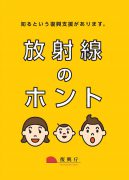By Kataoka Ryohei
The Reconstruction Agency’s ‘Truth about Radiation’

The Reconstruction Agency compiled a 30-page, A5-sized booklet titled Hoshasen no Honto (Truth about Radiation), which it published and began distributing in March 2018. As of November 2018, 22,000 copies had been distributed to relevant government agencies and participants of functions such as PTA conventions (in Saga and Niigata) in and outside of Fukushima Prefecture. It is part of a “safety campaign” aimed at promoting recovery from the Fukushima nuclear accident.
It presents a one-sided view, saying for example, “No proof of health impacts has been found (from the Fukushima Daiichi nuclear accident),” “The occurrences of numerous cases of thyroid cancer from radiation are considered not worthy of consideration,” “The amount of radiation in the major cities of Fukushima is decreasing,” and “The people who have gone back to their hometowns are returning to their normal livelihoods.”
It contains three particularly big mistakes that were pointed out in citizen group negotiations with the government held in December 2018. One is the statement that the effects of radiation are “not inherited genetically.” The Ministry of the Environment’s “Integrated basic information on health effects caused by radiation” (published in 2015) states that “The International Commission on Radiological Protection (ICRP) estimates the risk of hereditary influence at 0.2% per Gray.” It is a mistake to conclude that the effects are not passed along genetically.
[…]
The second mistake is found in the “Standards for radioactive materials in foods” table (shown below) regarding cesium 134 and 137. The figures on Japan’s standards for food in “normal” times are identical to the figures of the EU, US and Codex Alimentarius Commission for times of emergency. The booklet compares figures from circumstances so different as to be incomparable and states “standards are set at the world’s strictest level.” The truth is that the standards for drinking water at normal times are 8.7 Bq/kg in the EU, 4.2 Bq/kg in the US and not specified under the Codex Alimentarius. The Ministry of Health, Labor and Welfare (MHLW), the Consumer Affairs Agency and the Reconstruction Agency have all recognized this error, but it remains uncorrected at present.
The third mistake is the statement that “The increase in cancer risk due to 100-200 milliSieverts (mSv) exposure is about the same as from insufficient vegetable consumption or excessive salt intake.” The National Cancer Center of Japan, which provided the original data on cancer risk from lifestyle choices such as eating too few vegetables, announced in 2008 that it could not find any connection between vegetables and cancer. Making such a comparison in spite of that can only be called intentionally dishonest in that the booklet attempts to make exposure look less risky than it is.
[…]
Read more.




